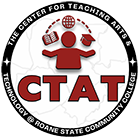http://ctat.roanestate.edu/de-course-rubric-academic-integrity/
Rubric for Academic Integrity in Online Courses
| Baseline | ✓ | Effective | ✓ | Exemplary | ✓ |
|---|---|---|---|---|---|
| Instructor mentions plagiarism and other forms for academy dishonesty in syllabus, including penalties for plagiarism and cheating in syllabus. | In addition to statement about academic integrity on the syllabus, instructor discusses plagiarism and other forms of academic dishonesty in course materials and/or through discussion board posts | In addition to statement about academic integrity on the syllabus, instructor offers specific examples of types of plagiarism and other forms of academic dishonesty, including if appropriate, ways to correctly cite quote and cite material |
Click here to reveal a more detailed list of Best Practices for Academic Integrity
Academic Integrity
- Course Development – Course a bides by copyright and fair use laws
- Code of Conduct – A code of conduct, including netiquette standards and academic integrity expectations is provided.
| Instructor provides limited opportunity for students to ask questions about academic integrity. | Instructor invites feedback and questions about academic dishonesty and penalties | Instructor regularly returns to the topic of academic dishonesty if appropriate (e.g., when introducing research assignments) |
| Instructor does not provide opportunity for students to demonstrate what they have learned about academic dishonesty | Instructor provides limited opportunity for students to demonstrate what they have learned about academic dishonesty | Instructor provides multiple opportunities to demonstrate what they have learned about academic dishonesty (quizzes, discussion threads, etc.) to ensure that they understand the concepts |
RSCC Online Peer Review (opens in new window)
DE Course Rubric – Org Design (opens in new window)
DE Course Rubric – Inst Design (opens in new window)
